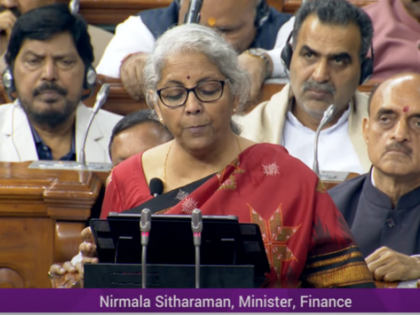Budget 2023: Key winners and losers
By Lokmat English Desk | Published: February 1, 2023 07:25 PM2023-02-01T19:25:02+5:302023-02-01T19:30:03+5:30
On Wednesday, Prime Minister Narendra Modi's government presented India's annual budget, including several initiatives to enhance infrastructure, create more ...

Budget 2023: Key winners and losers
On Wednesday, Prime Minister Narendra Modi's government presented India's annual budget, including several initiatives to enhance infrastructure, create more employment, and attract investment ahead of next year's important national election.
With a year until the Lok Sabha elections, it’s crucial for the PM to tackle the issues of high unemployment and inflation as he seeks to win a third consecutive term. To address the inequities exacerbated by the pandemic, Finance Minister Nirmala Sitharaman focused on farmers, so-called backward castes, and women.
The government raised capital spending by 33% to 10 trillion rupees ($122 billion), allowing the country to build its network of roads, ports, and airports and making it an appealing investment destination.
Winners
Agriculture: The government has boosted expenditure on agriculture, which accounts for about 19% of the economy. The budget proposes spending 22 billion rupees ($269 million) on high-value horticulture and establishing an agriculture accelerator fund to finance farm startups. Companies like Kaveri Seed Co., Dhanuka Agritech Ltd., Bombay Super Hybrid Seeds, and Rashtriya Chemicals & Fertilizers Ltd. will benefit from this.
Tourism: India will select 50 destinations to boost domestic tourism to capitalise on the surge in travel demand. It will also develop an app to guide travellers through food streets, security, and physical and virtual connectivity to enhance their experience. Beneficiaries will include ticketing companies and hotels such as Indian Railway Catering and Tourism Corp., Thomas Cook India Ltd., Indian Hotels, and EIH Ltd.
Infrastructure: India has decided to build 50 additional airports, heliports, and aerodromes, as well as identify 100 new projects that are critical to improving last-mile connectivity. A record capital outlay of 2.4 trillion rupees will benefit the railways. Airport operators such as Adani Airport Holdings Ltd., GMR Airports Infrastructure Ltd., and GVK Airport Developers Ltd. and construction companies such as Larsen & Toubro Ltd. and Bharat Heavy Electricals Ltd. will benefit from this.
Taxpayers: Taxpayers got some relief from Modi's administration, as expected. Individuals earning up to 700,000 rupees would not be required to pay tax under the new income tax regime. The number of tax slabs was reduced, and the maximum tax rate was dropped to 39%. This will leave more money for the middle class, which can also boost consumption and demand.
Metal and cement: Higher capital expenditure and investments for housing, infrastructure, and railways announced in the budget are positive for steel mills and cement makers. Key gainers include Tata Steel Ltd., JSW Steel Ltd., and Jindal Steel & Power Ltd.
Electric Vehicles: India intends to boost green mobility by exempting from customs duty the capital goods necessary to produce lithium-ion cells used in batteries for electric vehicles. This would benefit battery manufacturers such as Exide Industries Ltd. and Amara Raja Batteries Ltd., as well as automakers such as Tata Motors Ltd. and Mahindra & Mahindra Ltd.
Green Energy: The budget provided 350 billion rupees in investment in energy transition and carbon neutrality initiatives. The government will provide financial support for battery energy storage systems with a capacity of 4,000 megawatt-hours.
Losers
Cigarette Makers: In early Mumbai trading, shares of ITC Ltd. and Godfrey Phillips India dropped after India raised a tax on specified cigarettes by nearly 16%, effective Feb. 2.
Jewellers: Jewelry stocks dropped after the government left the import taxes on gold unchanged despite demand from the bullion industry to reverse the hike announced in July. The government also increased the import tax on silver. A higher tax increases the cost for consumers as the country imports almost all the bullion it consumes. The benchmark gold futures in Mumbai rose as much as 1.3% to an all-time high of 57,950 rupees per 10 grams. Key losers would be Kalyan Jewellers India Ltd., Titan Co., and PC Jeweller Ltd.
Oil Refiners: Indian state-run refiners Indian Oil Corp., Bharat Petroleum Corp., and Hindustan Petroleum Corp. are likely losers because the government has not announced any compensation for losses suffered in keeping diesel and gasoline prices under control. Companies and the oil ministry have asked for budgetary assistance to help offset some of the losses.
Foreign Carmakers: Imported vehicles, including electric vehicles, will face higher taxes. Customs duty on automobiles and EVs valued above $40,000 imported in fully-assembled units has been raised to 70% from 60%. Foreign automakers such as BYD Co. and Mercedes Benz, which rely on imported vehicles to supply the Indian market, may have difficulties.
Open in app